by Robert Lynch; July 13, 2025
“I can think of a lot, lot, lot better ways to spend 80,000 a year that would directly impact kids.”
Ithaca Board of Education member Jacob Shiffrin, July 8th
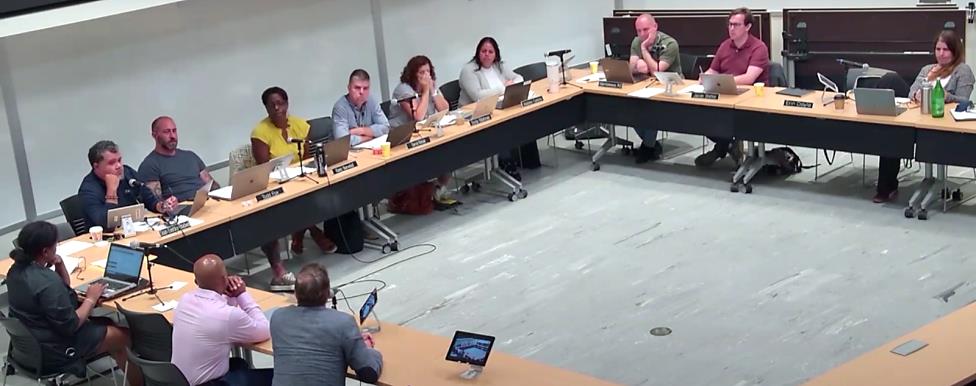
Attempting to pick apart a $169 Million Ithaca City School District Budget can overwhelm the brain to the point of mental exhaustion. Buying a school principal’s cell phone with taxpayer money becomes a whole lot easier to wrap one’s mind around.
The Ithaca Board of Education at its organizational meeting July 8th revisited its current policy—and it will return to the policy again next month—of providing certain “select district employees” free cell phones as a benefit of their employment.
“Who do we provide cell phones to, why, and how much does it cost?” newly-elected Board of Education member Jacob Shiffrin asked fellow Ithaca City School District (ICSD) board members and staff that Tuesday. It was Shiffrin’s first question after taking his oath of office.

Zach Lind, Assistant Superintendent for Human Resources and Technology, was quickly summoned to the head table. Lind said he couldn’t provide exact numbers, but estimated “off the top of my head,” that Verizon charges about $60 per month for each employee’s “zero-cost phone,” and imposes a total annual bill to the district of about $80,000.
“I can think of a lot, lot, lot better ways to spend 80,000 a year that would directly impact kids,” Shiffrin reacted to the long-standing purchasing practice. “I’m shocked that we did this.”
Shiffrin, the only candidate from a three-person slate of reform-minded insurgents to win an ICSD board seat last May, said he’d talked with parents, principals, and teachers and “could list out right now 500 things” that would better support students than providing free cell phones to school personnel.
“I think we should not do this,” Shiffrin said of providing free cell phones to upper-level staff.
A resolution to continue the selective employee mobile phone benefit was sandwiched among nearly 40 mostly-routine organizational resolutions addressed by the Ithaca School Board during it’s three-hour Tuesday morning session. Of those many matters, the cell-phone resolution was among only one or two that grabbed significant attention.
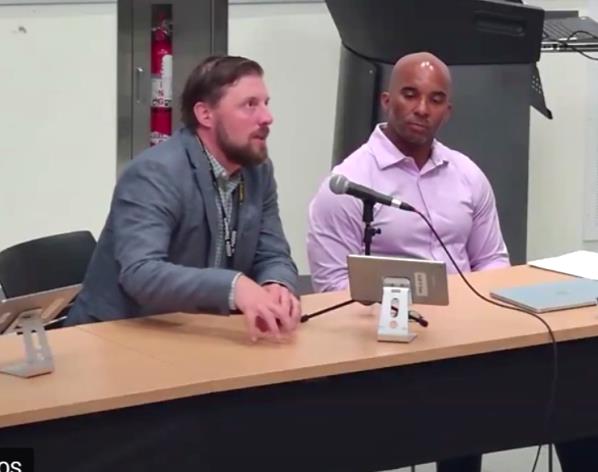
Halted in its otherwise hasty parliamentary pace, the board first tabled its vote on the cell phone matter until after a more than hour-long executive session, one during which the issue was predicted to come up. Yet when board members emerged from the closed conclave, they further tabled the cell phone resolution until their next session, August 12.
Questioned after adjournment to enumerate how many employees carry district-paid cell phones, HR and IT administrator Lind hedged. He declined to give a firm number until August. But working the math, based on the administrator’s estimated monthly rates and total cost, one arrives at an employee headcount of about 110.
“We’re providing cell phones to folks usually in leadership roles or really active service roles where they’re needed to be on call as part of their job, but they’re not always in a specific location,” Lind explained Tuesday to Shiffrin and to other board members. He used the Director of Facilities as one example, an administrator whose job takes him from building to building.
I’d “love to get out of the business of providing cell phones to employees,” School Superintendent Dr. Luvelle Brown acknowledged. But Brown admitted that “it gets rather complicated and challenging” to actually cancel the employee benefit.
This year was not the first time that employee cell phones gained scrutiny at the start of the official school year. It did last July as well.
“This has been kind of an annoyance for me for a while,” former Board of Education member Jill Tripp stated when the board reorganized on July first of 2024. ”I believe that the cell phone expenditure in the district is unwarranted and redundant, and I would like a further convincing explanation as to why we need to be providing cell phones to people.”
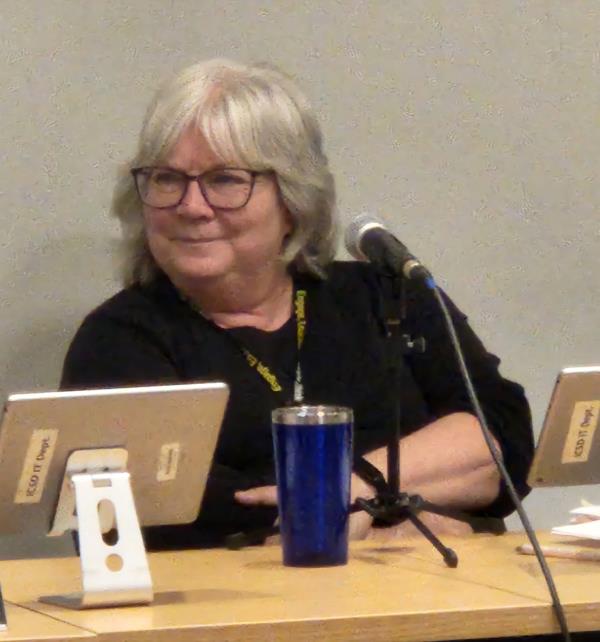
Dr. Tripp lost her bid for reelection last May, replaced, as fate would have it, by Jacob Shiffrin. And during her final year of office, Tripp never received the answer she’d sought.
“We really haven’t had conversations about it,” Board member Adam Krantweiss said of the cell phone policy at this more recent reorganization. “It is very expensive, and it seems like there are a lot of other options because everybody has a cell phone that they’re carrying around 24 hours a day,” Krantweiss pointed out. “We could purchase second lines. We’ve talked about all these different options before.”
“We have to take into consideration that our district employees may not want to use their personal cell phones for business purposes,” board member Karen Yearwood interjected.
And then there’s the argument of wanting to untether yourself from your job when off-the-clock.
“When we talk about mental health, being able to turn off your work phone on a vacation or whatever is critical,” board member Erin Croyle remarked.
“It keeps coming up; it’s been coming up; it will continue to come up,” Board President Sean Eversley Bradwell acknowledged. “But I don’t want us to think that just because we’re taking away cell phones that there will not be an additional cost,” he cautioned.
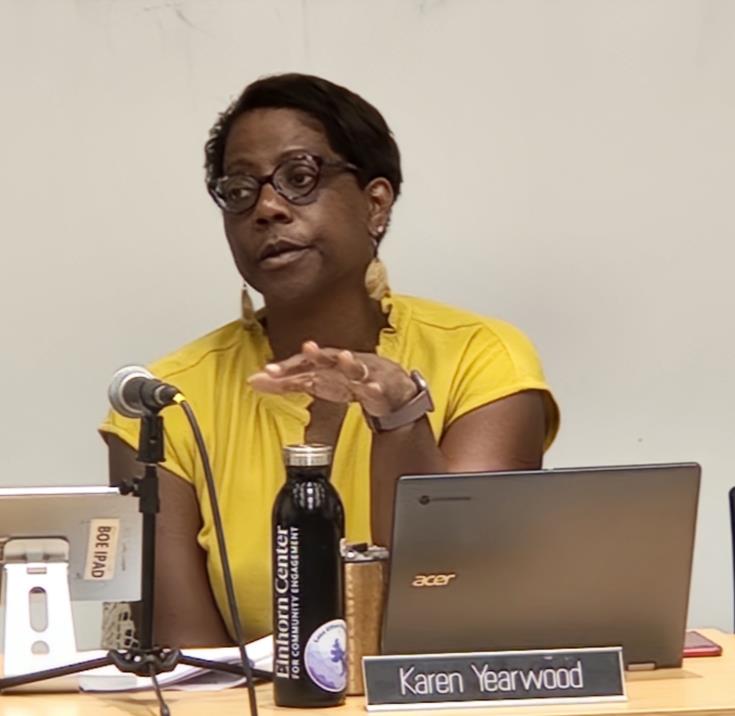
Eversley Bradwell said the cell phone benefit may be “a negotiated item,” with some employees. Yet when Shiffrin asked whether it’s a contractual obligation, the board president declined to say.
If cell phones aren’t provided, “stipends” might be needed to compensate key staff for the business use of their personal devices, Shiffrin was told. And there’s a legal argument. If one’s job-related duties result in a lawsuit, could the individual’s phone and of all of its contents—business and personal—be subpoenaed as evidence?
“Personal phones could be “foilable,” Eversley Bradwell warned. Some board members thought the district’s legal counsel should weigh in.
Superintendent Brown claimed that ICSD taxpayers shoulder only about $20,000 of the $80,000 cell phone expense. Federal rebates pick up the remaining cost, he said. The discussion never ventured into what would happen if Trump-era austerity cancels those reimbursements.
But the recurring question of cell phones as an educational perk demonstrates once again that when it comes to governmental spending, it’s the little things that count the most. The cell phone expense totals less than five-one hundredths of one percent of this year’s ICSD budget. But it’s like last year when the district’s rental of high-tech “clocks” for all school buildings—admittedly more costly an investment—raised heightened taxpayer concern.
Expect the cell phone issue to rear its head again August 12, when the Ithaca Board of Education next meets.
****
Picking the Ithaca Board of Education’s new leadership for the twelve months ahead proved smoother this year than last. Whereas last year’s election for Board President and Vice President went through multiple rounds, this year’s elections resolved themselves on the first ballot.
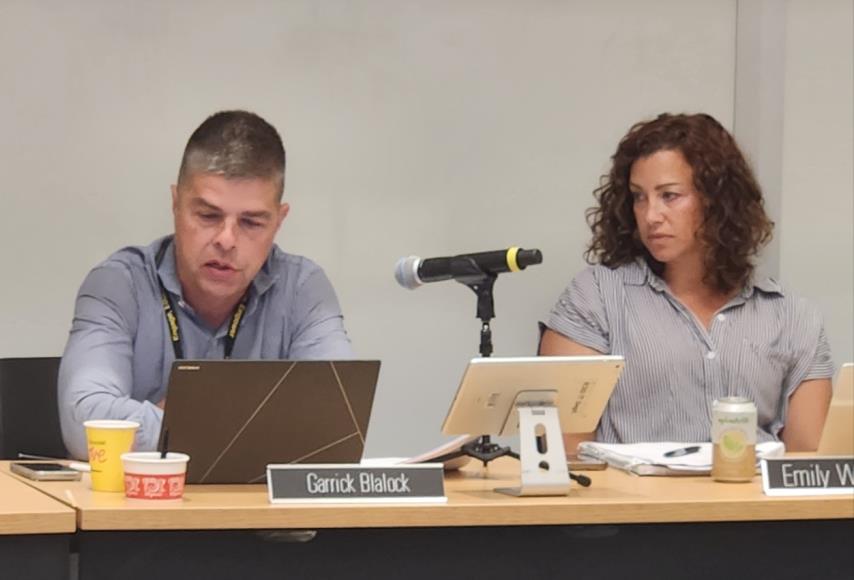
Without opposition, Sean Eversley Bradwell was reelected Board President. Employing a new secret ballot procedure adopted quietly during the past year, Garrick Blalock succeeded Adam Krantweiss as Vice President, beating fellow board member Emily Workman, five votes to four.
Prior to the vice presidential ballot, neither Blalock nor Workman drew ideological lines between each other. Blalock stressed that he’d attempt to avail himself of Eversley Bradwell’s “expertise” and “absorb the knowledge he’s acquired over the years” in the expectation that Eversley Bradwell’s current term as Board President may be his last.
What mattered most for Enfield parents and students that day might never have gotten reported had not a keen reporter kept an eye to last-minute agenda changes with full knowledge of the vacancy list.
Inserted as an “addendum” to its Personnel Report following its one-hour, 20-minute executive session, the board promoted Stephen Anderson to become Principal of Enfield Elementary School. It also elevated Tara Caiza to become Principal at Fall Creek Elementary.
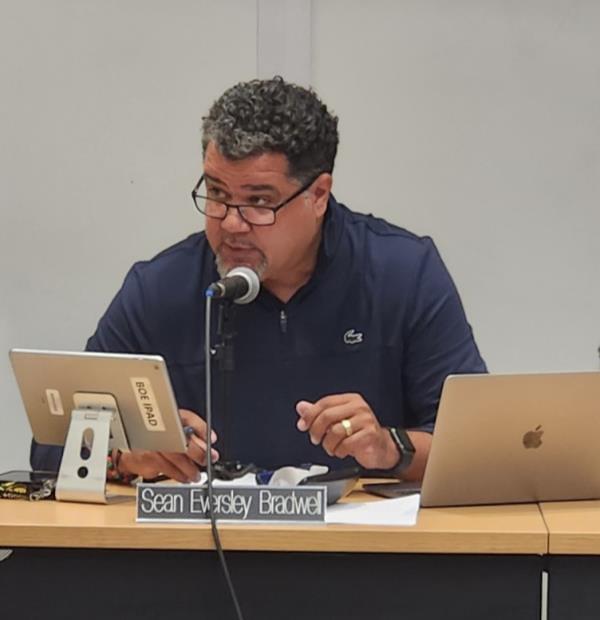
Anderson joins Enfield having served this past year as an “Educator of Inclusion” at Boynton and DeWitt Middle Schools. Caiza served as the Associate Principal at Boynton.
For reasons unknown, each promotion got exceedingly low-profile treatment. Neither appointee’s name was ever mentioned at the meeting.
Stephen Anderson succeeds Enfield Principal Keith Harrington, whom the district recently transferred to become Principal at the Lehman Alternative Community School.
Later Tuesday, in an open letter to Enfield parents, Anderson wrote:
“Enfield Elementary is a joyful and vibrant learning community, surrounded by fields, orchards, and outdoor spaces that invite wonder and exploration.”
Enfield’s newly-appointed Principal continued, “I look forward to learning from the amazing work already happening here, especially the integration of equity, sustainability, and community partnerships that define Enfield’s identity as an edible, equitable, farm school.”
###

